Sharing Slogans, Calling Cabs, and Other Moments of Madison Avenue Magic
What do you do when you find yourself in a room full of the people that imagineered your childhood?
You lose all social poise and most of your moxie -- not on purpose, but inevitably.
That's what it felt like during last night's press debut for Real Men and Women of Madison Ave.: Their Influence on American Culture. As I walked across the floor, treading over familiar phrases like "Got milk?" with Ed McCabe! and Judy Wald! at either elbow, I fell back (hard!) on responses like, "Awesome!" and "Woooow!" and "Ha-ha-HA!" -- sometimes even before they could finish a sentence.
But everyone managed my panic-stricken behaviour with grace. Bill Green saved me from abject humiliation by joining Ed in condemnation of Mad Men, which is "Nothing like how [agency life] actually was!" -- a refrain I'd hear again and again.
According to the man who told us our roads were strewn with broken promises, agency life in the Mad Men days was far less depressing -- and not nearly so demeaning to women.
"There was a very high level of fraternization at the office," he admitted, "because so many people worked on projects together. It's not like men were slapping women's butts and going, 'Hey baby, let's you and me go to the conference room.'"
Mad Men "[makes] it seem like all the women were secretaries!" he scoffed. "Really, advertising was one of the first industries where women rose to executive positions."
As if summoned, my eyes rose to the oversized portraits of the sharp-eyed and smiling women lining the walls, their taglines and prints peddling product in beguiling, self-affirming ways:
"What's your favorite?" I whispered to the One Club's Joni Davis. With glazed eyes, she looked to Gimbel's. "They were talking to a different kind of woman -- one who didn't go out much," she said softly. "They were doing something new."
Joni's mind moves quickly. Too soon after drawing me down the path of sentimental domesticity, she drew me back to the strange world inhabited by Julian Koenig -- who was, rightfully, quite insistent about which "Think Small" print would appear in the show, and who declined the invitation of a chauffeur because damned if he's too old not to get here himself -- and Ed McCabe.
"You know, Ed gave everything up at the height of his career to join a race in Europe that just goes forever," she emphasized.
"Is that true?" I said to Ed.
"Oh yes," he said. "Paras to Dakar. We did it by car. Twenty-two days through the Sahara."
"You should've done it by camel," I said.
"Too SLOW!" Ed retorted with a playful grin. "And they spit."
See video of Ed and Joni discussing the race. Then Ed talks to me about whether he did everything he ever wanted to.
Around this time I considered saying hello to George Lois -- who sized me up with total apathy when we were introduced. The thought of being back under his gaze -- the man who made Muhammad Ali a pincushion! -- made me all clammy.
No camel jokes would win him over. I retreated to a safe corner with Bill, who propelled me in the direction of creative headhunter Judy Wald. To my not-so-secret delight, she warmly commandeered me for the next hour, and I strode beside her like a confident pup.
"I was supposed to meet an intern here," she said. "I can't imagine where he could be."
"What is his name?" I said.
"His name isn't important," she said, probably perceiving I wouldn't know him anyway. "But he's six foot two ... a young man."
"He'd be hard to miss," I said. Check me out, Miss Not-at-All-Witty.
Judy indulged me by telling me his name anyway, and I promptly forgot it. Then we wandered the floor looking for him, occasionally stopping so she could visit with admirers or agency icons.
"So do you know many of the people here? Is this like one big reunion, with dormant passions and dead conflicts all rekindled?"
"Oh, no," she laughed. "None of that. It's just interesting to see the new ones..." She paused to watch an older man in a blue suit, with a charming silk handkerchief folded in his breast pocket, walk by. "When I see ones with gray hair, I feel like I should know them!"
Bill had commented on the suit-and-handkerchief man in a much-earlier rant about the difference between creatives today and the ones predating, I don't know, Advertising Age. "Look at that!" he exclaimed. "And look at THAT!" (This time, motioning toward the collage of famous portraits.) "No graphic tees! Imagine those heads, except with graphic tees."
Near the end of the night Judy let me call her a cab, which left me in a starry-eyed stupor for the remainder of the exhibit.
"I called a cab for her!" I shouted in Bill's general direction. "And one CAME!" It was like a fairy tale, I wanted to add, but didn't, because he'd obviously lose respect for me.''
"Uh huh," Bill said indulgently.
Too elated to socialize after a coup of such enormity, I spent the next half-hour taking shots of ads. A modern-day creative director broke my concentration to exalt the warring Hertz versus Avis campaigns: "This one is like a response to that one!" he said, to which I replied, "Yes! Exactly!", but I couldn't say more because I found his genie pants distracting.
Long before my retreat into ad-stuffed solitude, I caught up with Rob Wenger and Carly Heims, the winners -- and trophy lickers -- from Wrath of Cannes. They brought a welcome "real people" vibe to the room. See video of us exploring the glory and glamour of recognition-while-inebriated.
Then the lights dimmed. Bill left. The library's security guards waved us gently, but firmly out. And as quickly as the whirlwind began, it passed.
Want more? Check out my flickr and photographer Ric Kallaher's website.
Special thanks to Mary Warlick of the One Club, John Ganly of the New York Public Library, and Rosen Group PR.
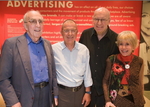
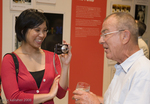
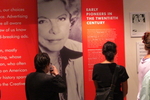

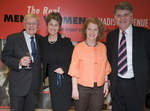
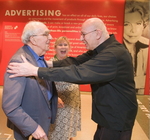
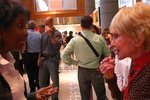
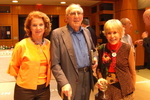

Comments
Post a comment